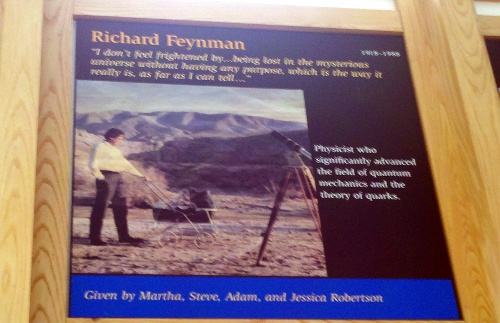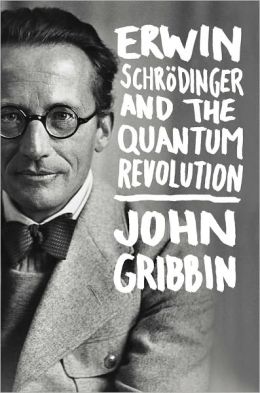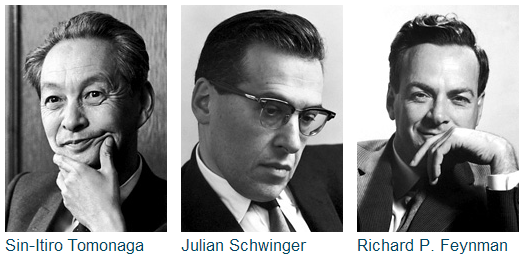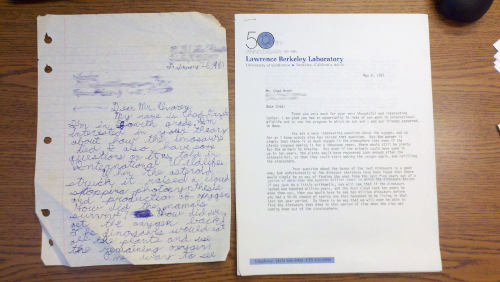A little while back, I posted about the pro-theorist bias in popular physics, and Ashutosh Jogalekar offers a long and detailed response, which of course was posted on a day when I spent six hours driving to Quebec City for a conference. Sigh. Happily, ZapperZ and Tom at Swans On Tea offer more or less… Continue reading Experiment and Theory in the Popular Imagination
Category: History of Science
Blogging Is Not Mandatory
I mentioned on Twitter that I was thinking of proposing a Science Online program item about the professionalization of blogging, throwing in a link to post from a couple months ago. That included a link to this SlideShare: Talking to My Dog About Science: Why Public Communication of Science Matters and How Social Media Can… Continue reading Blogging Is Not Mandatory
Real Scientists Have Families, Too: Photo Edition
While we’re revisiting blog topics of the recent past, another item from this weekend’s visit to the Ithaca Sciencenter, in the form of the picture above. For those with images off, or who read via RSS and won’t see the picture, it’s a photo of one of the inspirational plaques they have lining the walls… Continue reading Real Scientists Have Families, Too: Photo Edition
American Physicists and the Under-rating of Experiments
At Scientific American’s blog network, Ashutosh Jogalekar muses about the “greatest American physicist”, eventually voting for Josiah Willard Gibbs, one of the pioneers of statistical mechanics. As both times I took StatMech (as an undergrad and in grad school), it was at 8:30 in the morning, I retain almost no memory of the subject, and… Continue reading American Physicists and the Under-rating of Experiments
Wolfgang Pauli, Father of the arXiv
The book-in-progress (which is coming along, albeit slowly, thanks for asking) is built around making analogies between scientific discoveries and ordinary activities. This necessarily means telling a lot of historical stories, which is both good and bad. The bad part is that actual history is way messier than the streamlined version you get to use… Continue reading Wolfgang Pauli, Father of the arXiv
Erwin Schrödinger and the Quantum Revolution by John Gribbin
Erwin Schrödinger is one of the more colorful figures in physics history. He’s best known for Emmy’s favorite thought experiment, of course, which attempts to demonstrate the absurdity of quantum physics through locking a cat in a box. This overshadows the Schrödinger Equation, the central equation of non-relativistic quantum mechanics, which won him a Nobel… Continue reading Erwin Schrödinger and the Quantum Revolution by John Gribbin
Real Scientists Have Families, Too
I was re-reading bits of James Gleick’s Feynman biography, and ran across a bit near the end (page 397 of my hardcover from 1992) talking about his relationship with his children, talking about how ordinary he seemed at home.I particularly liked the sentence “Belatedly it dawned on them that not all their friends could look… Continue reading Real Scientists Have Families, Too
The Higgs Boson in Context
I ran across this recently while looking for something else, and was reminded of it by this discussion of jargon. It’s an attempt to explain the general historical context of the whole Higgs Boson thing, and why it’s important. I improvised this in response to somebody’s question about how I would explain that, drawing mostly… Continue reading The Higgs Boson in Context
Physics Is About Rules, Not Facts
While in the library looking for something else, I noticed a book called The Trouble with Science by Robin Dunbar, whose description made it sound very much on point for my current project: In The Trouble with Science, Robin Dunbar asks whether science really is unique to Western culture, even to humankind. He suggests that… Continue reading Physics Is About Rules, Not Facts
Blast From the Past: Letter to and From Luis Alvarez
I have mentioned before that when I was a kid, I wrote a letter to Luis Alvarez, the 1968 Nobel laureate in Physics, asking some questions about his theory that an asteroid impact killed the dinosaurs, which had been featured in a NOVA special. I got a very nice letter back from him, very graciously… Continue reading Blast From the Past: Letter to and From Luis Alvarez



